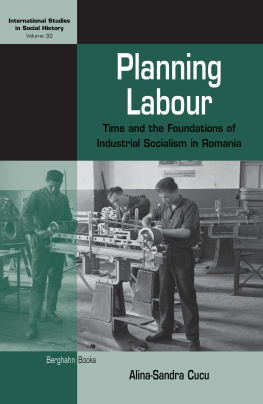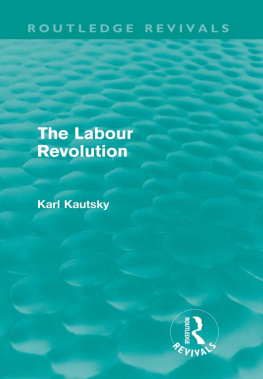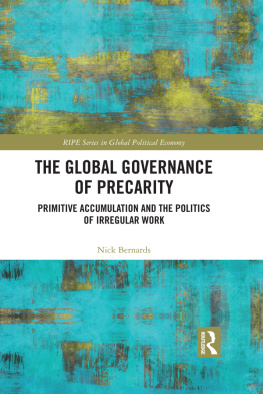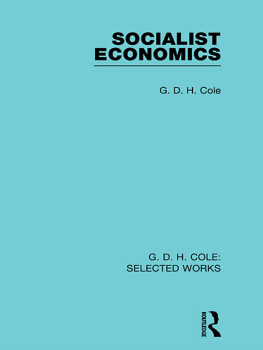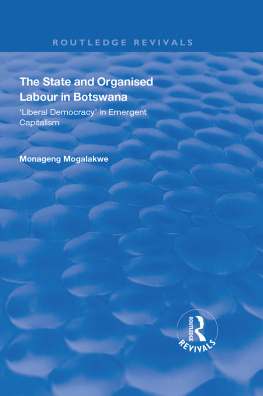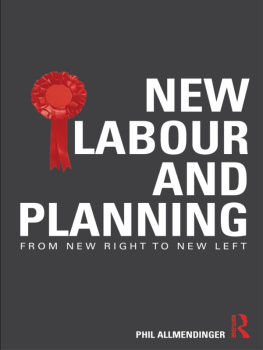Planning Labour
International Studies in Social History
General Editor: Marcel van der Linden,
International Institute of Social History, Amsterdam
Published under the auspices of the International Institute of Social History, Amsterdam, this series offers transnational perspectives on labour and working-class history. For a long time, labour historians have been working within national interpretive frameworks. But interest in studies contrasting different national and regional experiences and studying cross-border interactions has been increasing in recent years. This series is designed to act as a forum for these new approaches.
Recent volumes:
Volume 32
Planning Labour: Time and the Foundations of Industrial Socialism in Romania
Alina-Sandra Cucu
Volume 31
Categories in Context: Gender and Work in France and Germany, 1900Present
Edited by Isabelle Berrebi-Hoffmann,
Olivier Giraud, La Renard and Theresa Wobbe
Volume 30
What Is Work? Gender at the Crossroads of Home, Family, and Business from the Early Modern Era to the Present
Edited by Raffaella Sarti, Anna Bellavitis and Manuela Martini
Volume 29
Laborers and Enslaved Workers: Experiences in Common in the Making of Rio de Janeiros Working Class, 18501920
Marcelo Badar Mattos
Volume 28
Labour, Unions and Politics under the North Star: The Nordic Countries, 17002000
Edited by Mary Hilson, Silke
Neunsinger and Iben Vyff
Volume 27
Rescuing the Vulnerable: Poverty, Welfare and Social Ties in Modern Europe
Edited by Beate Althammer, Lutz
Raphael and Tamara Stazic-Wendt
Volume 26
The History of Labour Intermediation: Institutions and Finding Employment in the Nineteenth and Early Twentieth Centuries
Edited by Sigrid Wadauer, Thomas
Buchner and Alexander Mejstrik
Volume 25
Bread from the Lions Mouth: Artisans
Struggling for a Livelihood in Ottoman Cities
Edited by Suraiya Faroqhi
Volume 24
Bondage: Labor and Rights in Eurasia from the Sixteenth to the Early Twentieth Centuries
Alessandro Stanziani
Volume 23
Migration, Settlement and Belonging in Europe, 15001930s
Edited by Steven King and Anne Winter
For a full volume listing, please see the series page on our website: http://www.berghahnbooks.com/series/international-studies-in-social-history
PLANNING LABOUR
Time and the Foundations of Industrial Socialism in Romania
Alina-Sandra Cucu
First published in 2019 by
Berghahn Books
www.berghahnbooks.com
2019 Alina-Sandra Cucu
All rights reserved. Except for the quotation of short passages
for the purposes of criticism and review, no part of this book
may be reproduced in any form or by any means, electronic or
mechanical, including photocopying, recording, or any information
storage and retrieval system now known or to be invented,
without written permission of the publisher.
Library of Congress Cataloging-in-Publication Data
Names: Cucu, Alina-Sandra, author.
Title: Planning labour : time and the foundations of industrial socialism in Romania / Alina-Sandra Cucu.
Other titles: Planning labor
Description: New York : Berghahn Books, 2019. | Series: International studies in social history ; volume 32 | Includes bibliographical references and index. |
Identifiers: LCCN 2019002248 (print) | LCCN 2019007092 (ebook) | ISBN 9781789201864 (ebook) | ISBN 9781789201857 (hardback : alk. paper)
Subjects: LCSH: Socialism--Romania--Cluj-Napoca--History--20th century. | Government ownership--Romania--Cluj-Napoca--History--20th century. | Central planning--Romania--History--20th century. | Romania--Economic policy--1945-1989. | Working class--Romania--Cluj-Napoca--History--20th century. | Cluj-Napoca (Romania)--Economic conditions--20th century. | Cluj-Napoca (Romania)--Social conditions--20th century.
Classification: LCC HX375.C58 (ebook) | LCC HX375.C58 C83 2019 (print) | DDC 331.109498/4--dc23
LC record available at https://lccn.loc.gov/2019002248
British Library Cataloguing in Publication Data
A catalogue record for this book is available from the British Library
ISBN 978-1-78920-185-7 hardback
ISBN 978-1-78920-186-4 ebook
TABLES
FOREWORD
What Was the Plan? And What Was It Meant to Do?
Don Kalb
As really existing socialism was dying and the new capitalism was not yet born, Katherine Verdery posed the urgent question with characteristic clarity: What was socialism, and what comes next? (my emphasis). She ventured that next might be a new feudalism rather than the capitalism most Western and Eastern commentators were hoping for. But in retrospect she seems to have been wrong-footed by the old historical schemas. She could easily be forgiven. What came next was a dependent semi-peripheral capitalism with oligarchic tendencies, a fuzzy hierarchical configuration that in the early 1990s could easily have been mistaken for a new feudalism, but which in the following decades became incorporated in transnational capitalist logics, lending it a more dynamic twist than Verdery could have perceived in the rubble of the socialist collapse.
Alina Cucu has written an important, rich and subtle book, Planning Labour. It has been written at a time in which questions about postsocialist futures cannot possibly be answered on a local level anymore and of course they could not either in 1990, which was Verderys methodological mistake. In general, it has been hard to think beyond capitalism of late. Alina Cucu has decided it is therefore time to go back to the old questions about socialism. And she answers them in perfectly cerebral, post-Cold War mode. She goes back to 1950s Romania, to Cluj-Napoca, looks closely at what was happening with labour regimes in two factories, and wonders about what is probably the most central question that can be posed in this context: what was the Central Plan?
The postwar literature on which Verdery based her idea of socialism (associated with Jnos Kornai and others) has seen central planning as a bureaucratic system for allocating quantifiable factors in which the prices, given the presumed absence of capitalist value and therefore accounting, were soft and fuzzy. They were objects of political negotiation rather than economic calculation and fact. Cucu does not reject this approach in its entirety but shifts the perspective decidedly towards a reading that is rooted not in economics but in a historical anthropology of labour and class. The picture that emerges is thrilling. The plan, for her, was a collective performative exercise in what might be called synchronization amid deep and tense non-simultaneity. It tried to call into being a working class that was, as such, as yet absent. At the same time, it was trying to empirically manage and coordinate the concrete productive practices of that projected working class in the here and now. But it was also seeking to cast that working class into the dream model of the future idealized socialist worker, perfectly assimilated to the behavioural and ideological requirements of socialism as a mode of production.

